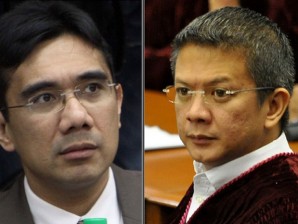1 or 2 lawmakers: JBC can’t decide
For three hours Thursday, the Supreme Court listened to arguments on why there should be one or two representatives from Congress in the Judicial and Bar Council (JBC), with one of the justices proposing a compromise: For the court to allow the House and the Senate to sit in the council until it could recommend to President Benigno Aquino on Monday its top three choices for a successor to ousted Chief Justice Renato Corona.
In the end, though, the justices retreated behind closed doors to discuss the controversy. They are expected to continue deliberations Friday, three days before the JBC sends its recommendations to the President.
Mr. Aquino has until August 27 to name a new Chief Justice.
It was an impassioned three-hour-long argument among Senator Joker Arroyo, who represented the Senate; Associate Solicitor General Roman del Rosario, who represented JBC members Senator Francis Escudero and Iloilo Representative Nathaniel Tupas; and former Solicitor General Francisco Chavez, whose questioning of the dual representation of Congress in the JBC started it all and who argued that the court should uphold its order favoring his petition to declare Congress’ having two representatives in the council unconstitutional.
The discussion centered on the interpretation of Section 8 of Article VIII of the Constitution on the JBC’s composition. The JBC screens the nominees for positions in the judiciary. It is currently vetting the nominees for a successor to Corona, who was impeached and removed from office in late May for violation of the Constitution.
Article continues after this advertisementAbad didn’t inhibit
Article continues after this advertisement
Ten justices took part in the oral arguments, including Associate Justice Roberto Abad, a nominee for Chief Justice but who did not inhibit himself, unlike his four colleagues who are also nominees for the top position in the judiciary.
Absent from the hearing presided over by Associate Justice Diosdado Peralta (who happens to be the presiding officer of the JBC) were Acting Chief Justice Antonio Carpio and Associate Justices Teresita Leonardo de Castro, Ma. Lourdes Sereno and Arturo Brion.
Arroyo asked the Supreme Court to correct through “judicial activism” the “inadvertence” of the framers when they “forg(o)t to cleanse the language” of the Constitution on the representation of Congress in the JBC.
Arroyo said the framers discussed and finalized the provision on the JBC, including the council’s composition, on July 20, 1986. The next day, however, they voted to approve a bicameral legislature and not the unicameral system under which Congress would have only one representative in the JBC, he said.
‘Be a policy maker’
He urged the Supreme Court to exercise judicial activism to correct the inadvertent error of the framers, as amending the Constitution to remedy the mistake was impossible given the failure of all previous attempts at Charter change.
Arroyo also urged the court to act “not only as interpreter of the Constitution but also as a policymaker.”
He said a singular congressional representation in the JBC was impossible because “the Senate cannot represent the House and the House cannot represent the Senate.”
Asked by Justice Mendoza if the court had the authority to add one more representative to the JBC, Arroyo said: “Sometimes we are stuck with certain questions. But five Chief Justices paved the way by relaxing it and adding one member (to the council).”
He pointed out that since the time of Chief Justice Andres Narvasa in 1994 up to the time of Corona, or 18 years, the court allowed two congressional representatives in the JBC. The five Chief Justices exercised judicial activism, he said.
Never questioned before
“No one questioned (the setup), not until this solitary petition,” Arroyo said, referring to Chavez’s plea.
He said no other party had joined Chavez in his petition and none of the nominees for Chief Justice had done so.
“Nobody would be prejudiced by the change,” Arroyo said.
Assistant Solicitor General Del Rosario appealed to the court to resolve through interpretation the “ambiguous’’ JBC provision.
Del Rosario said the ambiguity of the provision had to do with its reference of a representative of Congress sitting in ex-oficio capacity when Congress is made up two institutions “separate and distinct,’’ including in structure and composition.
